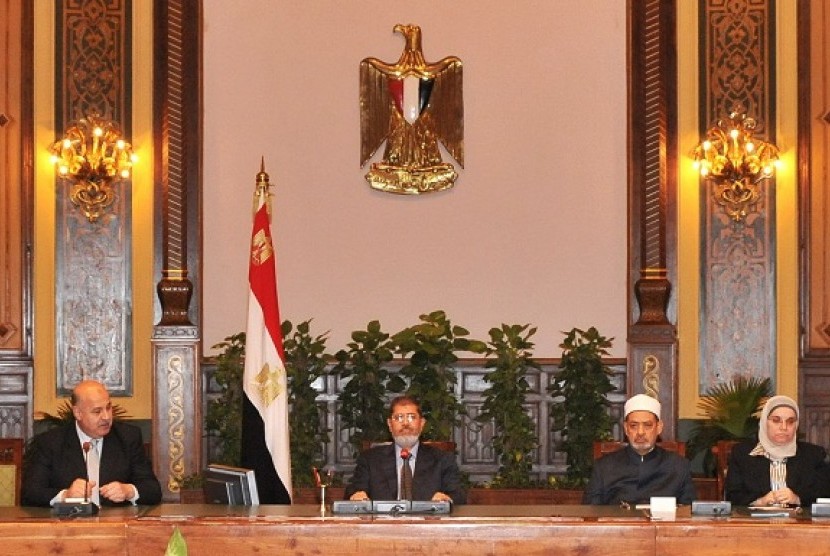REPUBLIKA.CO.ID, CAIRO - Egyptian President Mohamed Mursi has cancelled a decree that gave him sweeping powers and sparked violent unrest but did not delay this month's referendum on a new constitution that was a major demand of his opponents.
Islamist supporters of Mursi have insisted the referendum should go ahead on time on December 15, saying it is needed to complete a democratic transition still incomplete after autocrat Hosni Mubarak's overthrow 22 months ago.
Ahmed Said, a leading member of the main opposition National Salvation Front said the decision to press ahead with the referendum was "shocking" and would deepen a political crisis.
The announcement that Mursi had scrapped his November 22 decree followed talks on Saturday that ran into the night at his presidential palace. Billed as a "national dialogue", the meeting was boycotted by his main rivals and had little credibility among protesters in the most populous Arab nation.
After Saturday's talks, Mursi issued a new decree in which the first article "cancels the constitutional declaration" announced on November 22, the spokesman for the dialogue, Mohamed Selim al-Awa, told a news conference held around midnight. The new decree removed some parts of the old decree that angered the opposition, including an article that had given Mursi broad powers to confront threats to the revolution or the nation, wording opponents said gave him arbitrary authority.
Another article in the old decree had put beyond legal challenge any decision taken by the president until a new parliament was elected, reflecting Mursi's distrust of a judiciary largely unreformed from Mubarak's era.
That article was not repeated, but the new decree said "constitutional declarations including this declaration" were beyond judicial review. The new decree outlined steps for setting up an assembly to draft a new constitution should the current draft be rejected.
Further, the opposition was invited to offer suggested changes to the new constitution, echoing an earlier initiative by Mursi's team for amendments to be discussed and agreed on by political factions and put to the new parliament to approve. Yet, the National Salvation Front, whose members include Nobel Peace Prize laureate Mohamed ElBaradei and former foreign minister Amr Moussa, stayed away from Saturday's talks.
"It is making things a lot worse," Said, head of the liberal Free Egyptians Party, told Reuters. "I cannot imagine that after all this they want to pass a constitution that does not represent all Egyptians." He said the Front would meet later on Sunday to give a formal response.
Major compromise
Meanwhile, Shaimaa Khalil wrote an analysis in BBC News, said that Mursi's move was a major sign of compromise on the president's part and also an unexpected move. In his speech last Thursday President Morsi showed no willingness to give up the absolute powers he granted himself and which gained him titles like "dictator" and "Pharaoh".
But in a dramatic U-turn he has decided to give those powers up. This is good news for Egypt's judiciary, which felt particularly insulted by the president's decree because it basically deemed them powerless.
As for the opposition, it seems they've only won half the battle. The president did not budge on the other sticking point: the referendum on the controversial draft constitution. Vice-President Mahmoud Mekki said that a vote on the charter would go ahead as planned in a week's time.


